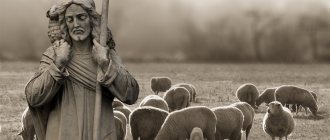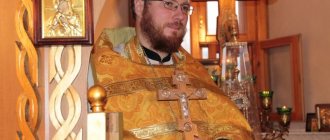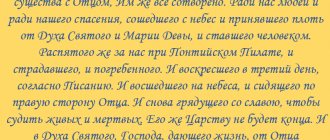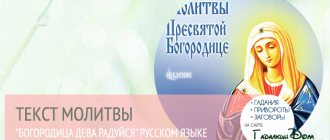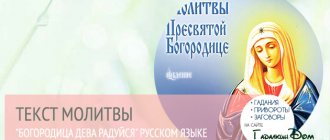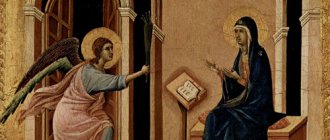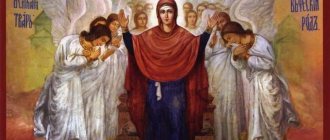What are psalms
Psalms are spiritual songs that make up one of the books of the Old Testament, the Psalter. The psalms were composed primarily by the king and prophet David, who lived a thousand years before the birth of Christ. Other authors are also known: Moses, David's chief psalmist Asaph, the sons of Korah, who were temple gatekeepers. There are 150 psalms in the Psalter, and Psalm 50 is one of the most famous.
King and Prophet David - author of Psalm 50 (Orthodox icon)
News
Ps. 50 :1. In the end, a psalm of song to David, always bring the prophet Nathan to him,
Ps. 50 :2. always going to Bathsheba.
David sings this psalm, which contains a confession of two crimes: the murder of Uriah and adultery with Bathsheba. He shows all people the saving path of repentance, as a kind of art of constantly winning victory over the enemy. For the one who always cares about repentance and commits it turns out to be the winner of the incessantly attacking (enemy). He introduces into the psalm a prophecy about the future general deliverance from sins in holy baptism, saying: “sprinkle me,” and the teaching about serving in the spirit. Finally, he shows that he has retained the gift of prophecy, because he does not ask to be given it, as he has already been deprived of the gift, but begs only not to take the gift away, saying: “don’t take it away from me”*****.
Ps. 50 :3. Have mercy on me, O God, according to Your great mercy.
Since the sin is great, it asks God for great mercy.
And according to the multitude of Your mercies, cleanse my iniquity.
Only God's bounty can wash hands defiled by murder. But to further clarify what has been said, he says:
Ps. 50 :4. especially washed me.
And here he asks for complete purification, so that the importance of the sin can be seen from everything. Or: since Nathan had already told him about the forgiveness of sin, and various disasters had greatly reduced it, he now says: I need cleansing and washing, so that the deeply rooted defilement may be completely destroyed. “Wash me above all from my iniquity,” that is, from the lawlessness of murder, “and cleanse me from my sin,” that is, from the sin of adultery. One must know that sin is a falling away from goodness, and lawlessness is a sin against the Divine law. This is the beginning of both sin and lawlessness. This is where they are similar to each other. For the one who sins deviates from the goal, which is in his nature and in accordance with it, and the goal of human nature is to live according to reason, avoiding foolishness. But the lawless person also, by living incontinently, sins against the law that was given to him in nature. And therefore, the disciple of Christ, the Apostle John, rightly brings into one both sin and lawlessness, saying: “Everyone who commits sin also commits lawlessness” (1 John 3 :4). In other words: sin is similar to lawlessness, because everyone who acts lawlessly sins.
Ps. 50 :5. For I know my iniquity.
And he said this about murder. “And I will take away my sin before me.” Everywhere he carries with him the remembrance of the sin of adultery, because this sin does not leave him and does not retreat from him, but always remains with him and torments him.
Ps. 50 :6. I have sinned against You alone, and I have done evil before You.
That is, having hidden himself from the eyes of every man in iniquity, he was not hidden from Your eyes only. That is why he says: “I have created evil in Your sight.” Having taken advantage of many things from You, I rewarded them with the opposite. However, he does not mean that he did not do injustice to Uriah: for was it possible to say this? But he says that he dared to commit the greatest iniquity before God, Who chose him and made him a King from a shepherd, or, since, having hidden himself from the eyes of everyone, he did not hide from the eyes of God, but, on the contrary, was convicted by a prophet, or, since, as a King, he did not was subject to human law, but, as a godly man, he was obedient to the one God, or, since none of the people convicted him, but the one God admonished him, he says: “Those who alone have sinned.”
for you may be justified in all Your words.
You, who transgressed the law, convicted me through the prophet. You are righteous, You have always delivered me from enemies, You have honored me with the kingship and the gift of prophecy, but I am vile and a murderer.
And win and never judge Ti.
This is a confession or confession of sins.
Ps. 50 :7. Behold, I was conceived in iniquity, and my mother gave birth to me in sins.
God’s original intention was that we should not be born through marriage and corruption, but the transgression of the commandment introduced marriage as a result of Adam’s iniquity, that is, as a result of deviating from the law given to him by God. So, everyone born from Adam is conceived in sins, subject to the condemnation of the progenitor. And what was said:
and in sins gave birth to me, my mother
means that the mother common to us all - Eve - was the first to give birth to sin, as she desired pleasure. That is why it is said about us, who fell under our mother’s condemnation, that we too are born in sins. David shows how human nature initially fell under sin in the crime of Eve, and how birth became subject to a curse. The word dates back to primitive times, wanting to show the greatness of God's gift.
Ps. 50 :8. You have loved the truth; you have revealed to me the unknown and secret wisdom of Yours.
The meaning of the speech is this: You, Lord, You who are the truth, love the truth, and want us to remain in the truth, cleanse us from ancient sin, and cleanse us with hyssop, so that we will be whiter than snow. He likens hyssop to the effectiveness of the Holy Spirit, as warming us and cleansing all filth in us. And the cleansing will be accomplished by hyssop, that is, by the Holy Spirit; because hyssop is a cleansing plant. Finally, with the words: “You have revealed Your unknown and secret wisdom to me,” he makes it clear that God revealed to him through the Holy Spirit everything that would happen, and that He laid down in His wisdom.
Ps. 50 :9. Sprinkle me with hyssop and I will be cleansed.
Having said: You gave divine laws and statutes, he adds even more: You bestowed certain purifications in the laws and through the sprinkling of hyssop. For the same purpose, now grant us something similar, since You are the same God. Or, perhaps, he secretly talks about some kind of sacrament. Moses in Egypt was commanded to sprinkle the blood of a sheep with hyssop on pragues (Ex. 12:22 ), and we were redeemed with the most “honest blood” (1 Pet. 1:19 ). So, since the sprinkling of blood served as a protection so that those living in the house would not suffer anything from the destroyer, then David rightly, making a mysterious reminder of that blood, says: “Sprinkle me with hyssop,” covertly meaning the future cleansing of all by the blood of the true lamb of Christ, desiring to be worthy of this purification, which alone can cleanse completely and make it whiter than snow.
Ps. 50:10 . My ears hear joy and joy.
By the Spirit you will prepare me again so that I can hear the joy and joy that will be in the last times. What is this if not the knowledge of the future resurrection, about which he taught, saying:
Will the humble bones rejoice?
When will our rotten bones rejoice? Is it not after the resurrection, when, as another prophet says, “our bones will languish like grass” (Isa. 66:14)?
Humble bones will rejoice.
The strength of my soul will rejoice, because before it was weak under sins.
Ps. 50:11 . Turn Your face away from my sins.
Again he turns to confession.
Ps. 50:12 . Create a pure heart in me, O God.
Renew, he says, my worn-out soul, upset by sin.
And renew the right spirit, that is, confirm it, in my womb.
This means the same as if to say: bring my mind into safety, so that it will no longer be easy for it to fall into sin.
Ps. 50:13 . Cast me not away from Thy presence.
Again he prays for the Prophetic Spirit to come upon him. For He left him because of sin.
Ps. 50:14 . Give me the joy of Your salvation.
This applies to the entire human race. He calls the coming of the Lord the joy of salvation, according to what Simeon said: “For my eyes have seen Your salvation” (Luke 2:30 ). He prays that he too may be a partaker of it.
And strengthen me with the Lord's Spirit.
The Spirit, Whom he previously called “righteous,” is here called “sovereign.”
Ps. 50:15 . I will teach the wicked your way.
As soon as You deliver me from sin, and then give me Your Holy Spirit, I will again teach those who break the law to walk in Your ways.
Ps. 50:16 . Deliver me from bloodshed, O God, God of my salvation.
Again he offers a prayer to get rid of the defilement into which he fell by the murder of Uriah, or better to say, to get rid of “bloods,” that is, from bloody sacrifices, as shown by the subsequent words of the psalm, which say:
Ps. 50:18 . As if if you had wanted sacrifices, you would have given them, and so on.
Ps. 50:16 . My tongue will rejoice in Your righteousness.
Symmachus translated it this way: “my tongue shall speak of Thy alms.” Having received remission of sins, I will not remain silent, but I will not stop praising You and will tell Your mercies. Since You have abolished the sacrifices under the law, which cannot grant remission of sins, therefore I myself have offered You the sacrifice that You loved; and this is a sacrifice made by repentance and a contrite heart.
Ps. 50:20 . Bless Zion, O Lord, with Your favor.
“Zion” is what the Church calls here. For when God the Father was pleased to “rule over all things” for His Son (Eph. 1:10 ); then He gave His good promises to His Church.
And may the walls of Jerusalem be built.
He calls the holy clergy who protect His Church the Walls of Jerusalem.
Ps. 50:21 . Then favor the sacrifice of truth.
When, he says, you have made Zion happy and the walls of Jerusalem are built, then sacrifices will be made, not bloody sacrifices, but sacrifices of righteousness, that is, praise.
The offering and the burnt offering,
and by burnt offerings he means the offering of righteousness and a bloodless sacrifice.
Then they will place bullocks on Your altar,
that is, bullocks of righteousness, so that everything will be from righteousness, there will be sacrifices of righteousness, and offerings of righteousness, and burnt offerings of righteousness, and bullocks of righteousness.
The history of the creation of the psalm
The creation of Psalm 50 is associated with an important episode in the life of King David. One day he succumbed to lust and entered into an adulterous relationship with a married woman, Bathsheba, after which she became pregnant. But David’s sinful fall did not end there. To get rid of her husband named Uriah, David sent him to certain death during the battle. So the king took upon his soul another grave sin - murder.
It is unknown how long David’s conscience slept until the prophet Nathan awakened it. He told the king a parable about a heartless rich man. He took the poor man's last sheep in order to prepare a treat for his guest. The rich man had a lot of his own sheep.
David became angry and expressed his readiness to punish the hero of the parable. Then the prophet told the king that he was this heartless rich man. Only now did David recognize himself in him and realize how guilty he had been before God. The king poured out his tears of repentance to God in a psalm he composed. Therefore, Psalm 50 is also called repentant.
Interpretation
The interpretation of Psalm 50 is based on highlighting King David's repentance for the sin he committed. Priests recommend saying it as often as possible, since we are all sinners and sometimes commit sins without even paying attention to it. This psalm is aimed at begging forgiveness from the Lord for His special mercy. Also, the meaning of this psalm suggests that we have carefully considered and remembered all our sins.
In response to our requests and prayers, the realization comes to us that the Lord is fair, no matter what we do. As we read this psalm, we ask the Lord:
Do you have a telegram? If yes, then you will like our Orthodox group: t.me/molitvaikona, come in, we are waiting for you!
to enlighten us, to teach us true faith, to show us the way to the Kingdom of Heaven.
We expect the Lord to send His grace to us and forgive us all our sins. The text of the psalm also conveys the message that sin harms not only our soul, but also our body. But after the forgiveness of sin, our conscience calms down, and harmony occurs in the body.
Also read: Prayer from the crown of celibacy and the seal of loneliness
In addition, the psalm refers to the acceptance of the sacrifice. This tells about those things that the Jews brought to the Lord and which are discussed in the Old Testament. Psalm 50 itself is in Aramaic, but in our time it can already be found in modern Russian. This is much easier for the average person to understand. According to legend, sin was transferred from the head of a person to the head of an animal. Since there was a death penalty for sin, the animal was killed.
Thus, an innocent animal died for a guilty person. This action has some analogy with the death of the Son of God. He, like the innocent Lamb, will take upon himself all the sins of humanity and die for it. After death, the animal was completely or partially burned on the altar. In addition, bloodless sacrifices were often offered to the Lord in the form of:
oil, wine, incense and flour.
Psalm 50: Interpretation
Repentance
The motif of confession, repentance, and heartfelt contrition is central to the 50th Psalm. In the first lines, David expresses his hope in the great mercy of God and asks for forgiveness and cleansing from sins. The king realizes the gravity of his sins and submits to the righteous and fair judgment of the Almighty. David also says that he was conceived in sin. But this is not self-justification, but a bitter recognition of the imperfection of human nature, and the weakness of which he succumbed to, violating God's Law.
The desire for purification
Further, David acknowledges the honor God showed him by once endowing him with the gift of prophecy, enlightening him and revealing His wisdom through him. To describe the much desired spiritual cleansing, the king resorts to various symbols and comparisons. Thus, David compares the cleansing of the soul with sprinkling it with hyssop. Hyssop is a plant that was used to sprinkle the blood of sacrificial animals onto defiled clothing and objects like a brush. Without this ritual they were considered unfit for consumption. David also says that a pure soul filled with grace is whiter than snow. He asks God for consolation and renewal of his spiritual nature.
Hope in God
In the second half of the psalm, King David says that, having been cleansed, he will be able to continue his service to God and people as a prophet. He calls the main sacrifice to God a humble and contrite heart. Salvation is impossible without awareness of one's sinfulness and sincere repentance.
The last lines of the psalm contain a request to God to revive the walls of Jerusalem and the service in the Temple. Among biblical scholars and theologians, there is an opinion that the ending of the psalm was added during the Babylonian captivity of the Jewish people, which occurred after the death of King David. These words express the repentance of the people for their sins, for which God allowed the captivity.
Story
Song 50 was written by King David shortly after his adultery with Bathsheba.
Other psalms of King David:
Psalm of David 22: “The Great Shepherd” Psalm of David 33: “I will bless the Lord at all times” Psalm of David 34: “Judge, O Lord, those who wrong me”
Israel was at war with the Ammonites at that time, but the king remained in Jerusalem and did not lead the army. One evening he saw a woman bathing and desired her, despite the fact that she was the wife of one of the warriors. The king spent the night with Bathsheba and released her, and a little later she announced that she was expecting a child.
King David and Bathsheba
David initially tried to arrange everything so that Bathsheba's husband Uriah would spend the night with his wife and think that she was carrying their child. But he refused to remain in bliss while his comrades were fighting and went back to war.
Then David decided, through the hands of the military commander, to send Uriah into the thick of the battle so that he would die. When Bathsheba mourned her husband, he took her as his wife. But the Lord, seeing the sin that David committed, despite the fact that he loved the psalmist very much, decided to punish and the child, whom Bathsheba gave birth to a little later, died.
The prophet Nathan came to the king and, on behalf of the Lord, announced why this happened and called King David to repentance. The result of this was the writing of the penitential 50th Psalm.
1. To the head of the choir. Psalm of David,
2. when the prophet Nathan came to him, after David entered Bathsheba.
3. Have mercy on me, O God, according to Your great mercy, and according to the multitude of Your mercies, blot out my iniquities.
4. Wash me from my iniquity many times, and cleanse me from my sin,
5. For I acknowledge my iniquities, and my sin is always before me.
6. You, You alone, have I sinned and done evil in Your sight, so that You are righteous in Your judgment and pure in Your judgment.
7. Behold, I was conceived in iniquity, and my mother gave birth to me in sin.
8. Behold, You have loved the truth in your heart and have shown me wisdom within me.
9. Sprinkle me with hyssop, and I will be clean; Wash me, and I will be whiter than snow.
10. Let me hear joy and gladness, and the bones broken by You will rejoice.
11. Turn Your face away from my sins and blot out all my iniquities.
12. Create in me a clean heart, O God, and renew a right spirit within me.
13. Do not cast me away from Your presence and do not take Your Holy Spirit from me.
14. Restore to me the joy of Your salvation and strengthen me with the sovereign Spirit.
15. I will teach the wicked Your ways, and the wicked will turn to You.
16. Deliver me from bloodshed, O God, God of my salvation, and my tongue will praise Your righteousness.
17. Lord! Open my mouth, and my mouth will declare Your praise:
18. For You do not desire sacrifice, I would give it; You do not favor burnt offerings.
19. Sacrifice to God is a broken spirit; You will not despise a contrite and humble heart, O God.
20. Bless Zion according to Your good pleasure; build up the walls of Jerusalem:
21. Then the sacrifices of righteousness, the wave offerings, and the burnt offerings will be acceptable to You; Then they will place bullocks on Your altar.
When repentant psalm 50 is read
The psalm is widely used by believers in home prayer, when the soul cries for its sins and needs consolation and forgiveness. The psalm is especially relevant during the period of Great Lent. Every Orthodox Christian should know this psalm by heart and resort to it after sinful deeds, thoughts and at a moment of regret about their mistakes.
The 50th Psalm is also included in the daily morning prayer rule and the procedure for Communion. Reading the psalm helps the believer to find in David’s repentance a reason for his own repentance, and in the king’s trust in God to see hope for his own cleansing from sins and the salvation of his soul.
Read us conveniently on social networks:
Tags: God have mercy on me, psalm 50, psalm 50 in Russian, psalm of repentance
The Lord's Declaration of David
Since the prophet came and personally conveyed the words of God, it testifies that the gift that the King had was damaged. God does not speak to him directly as before. The connection has been partially lost, so the psalm contains requests to renew the right Spirit. Sin deprives a person of Grace, he remains defenseless against evil. Here is the Lord's determination:
I gave you everything: wealth, kingdom, power. If there was not enough, all you had to do was ask, and you would get everything. You have broken the Law. He despised the word of God. For this, your son and Bathsheba will die.
To atone for lawlessness, you will have to endure “punishment” for purification, to suffer illness, sorrow or death. Christ brought us saving repentance. That is why, whenever something goes wrong, you must, first of all, confess, sincerely, as David repented of his atrocities.
Nathan announced another definition about the king: Having killed Uriah with the sword..., now weapons and war will not leave the house of the king of Israel. The fear of such a prospect even more compels us to completely cleanse ourselves from lawlessness, so that the consequences of the fall do not affect the state, relatives and personality of God’s anointed.

